The Truth About Fake Meat & Protein Bars (or: Should You Eat Soy Protein?)
This post may contain affiliate links. As an Amazon Associate, I earn from qualifying purchases. Please read my disclosure.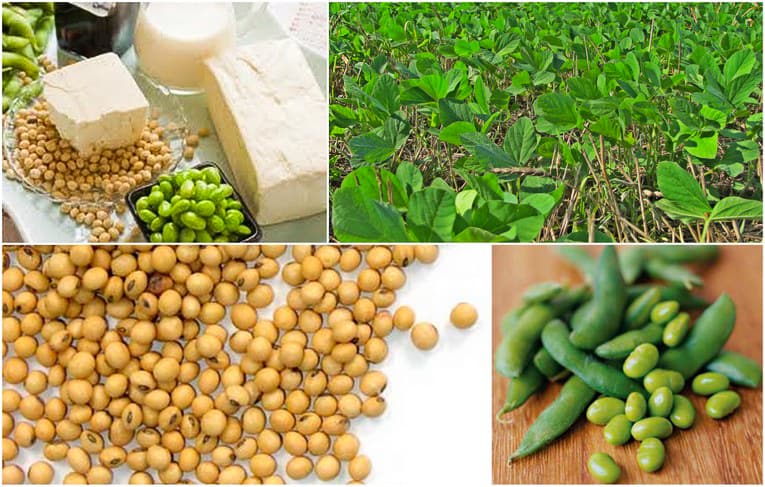
A few weeks ago, I was chatting with the husband about protein bars.
Since he (and I) are vegetarian and since we are both super active, I’m always looking for healthy, veggie-friendly protein. Unfortunately, with all of the fake-meat-soy-products and soy-based protein bars out there – that’s often hard to come by.
This is because soy protein isolate has been used as a high protein source in many veggie-friendly products – which I tend to avoid eating (more on that later).
I was explaining all of this to the husband, and he pointed out that the information out there on soy in general is super confusing, as is knowing what types of nutrition bars or veggie-friendly protein products are healthy to eat.
And he’s right! I was confused about soy protein for the longest time (half the articles out there tout it as a superfood, and half of them vehemently disagree with eating soy), and it was only after I did lots of reading and research that I was able to come to a few conclusions of my own.
So here it is …
The Picky Eater’s Guide to Soy: What to Eat and What Not to Eat!
First, let’s look at unprocessed soy products like tofu, tempeh, miso, etc. as well as non-soy protein that people sometimes confuse as soy (seitan).
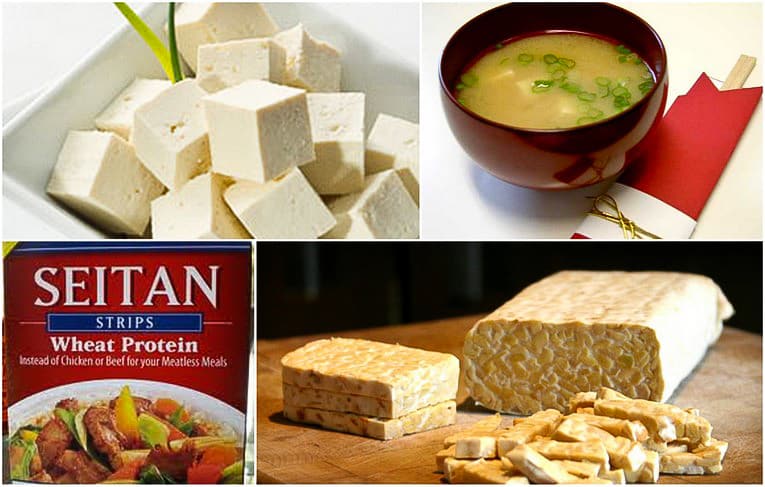
What are these products?
- Edamame are whole “young” soy beans – they are picked before the bean has hardened so you can eat them right from the pod.
- Tofu is made from whole soy beans. It is the bean curd that is mashed into blocks (after coagulating soy milk).
- Tempeh is made from fermented whole soy beans. The fermentation process binds the soy beans into a cake form.
- Miso is a thick paste made from fermented soybeans and barley or rice malt. It is used in Japanese cooking to make soups or sauces.
- Soy Milk is produced by soaking dry soy beans and grinding them up with water.
- Seitan isn’t soy at all! It’s actually a wheat protein made from wheat gluten.
Should you eat them? (you’ll see a theme here 🙂 )
- Edamame: Eat only if it’s 100% organic and non-GMO
- Tofu: Eat only if it’s 100% organic and non-GMO
- Tempeh: Eat only if it’s 100% organic and non-GMO
- Miso: Eat only if it’s 100% organic and non-GMO
- Soy Milk: Eat only if it’s 100% organic, non-GMO, and if the only two ingredients on the label are Whole Organic Soy Beans and Water
- Seitan: If it’s organic, 100% natural (no chemicals or other ingredients you can’t pronounce), and if you can tolerate gluten – it is fine to eat.
Why is it important to only eat organic soy?
Because over 90% of the soy in this country is genetically modified (GMO), unless it is organic. That means it’s more chemically altered, sprayed with toxic pesticides, and more processed compared to its organic relative.
The Bottom Line: Out of all of the unprocessed, whole soy products above – I’d recommend sticking to the fermented versions like tempeh and miso and enjoying the other soy products in moderation (more on why in the question below). And always choose 100% organic, non-GMO for any soy products you buy!
***
Now – onto the second question: What’s with the whole estrogenic-properties-of-soy thing?
Soy contains phytochemicals called isoflavones (aka phytoestrogens). Phytoestrogens are natural plant hormones that mimic estrogen in our bodies. For some people, these estrogens may help balance their hormones, but they can also throw off the hormonal balance for other people. The jury is still out on whether phytoestrogens are beneficial or “superfood-like.”
Eating soy is NOT the same as taking estrogen by any means. But some people are more sensitive to phytoestrogens than others — which is why I try to only eat whole soy products in moderation (not more than once or twice a week max). And I probably wouldn’t use soy-based forumla for babies because who knows how those phytoestrogens affect little ones.
BUT fermented sources of soy (like miso, tempeh, and natto) are actually better than non-fermented sources. Fermentation increases the digestibility of soy, adds good bacteria, and reduces the plant estrogen content in soy foods.
Side note: People with low thyroid functioning need to limit their soy consumption since soy contains substances called goitrogens which can slow the production and/or release of thyroid hormones in the body.
The Bottom Line: Eat soy in moderation and choose fermented when possible!
***
Lastly – the big question: What’s the deal with soy protein isolate and all of the veggie-friendly protein bars/products?
If you take a look at the nutrition label of most protein bars, veggie burgers, or fake-meat products, you’ll see soy protein isolate featured as one of the main ingredients.
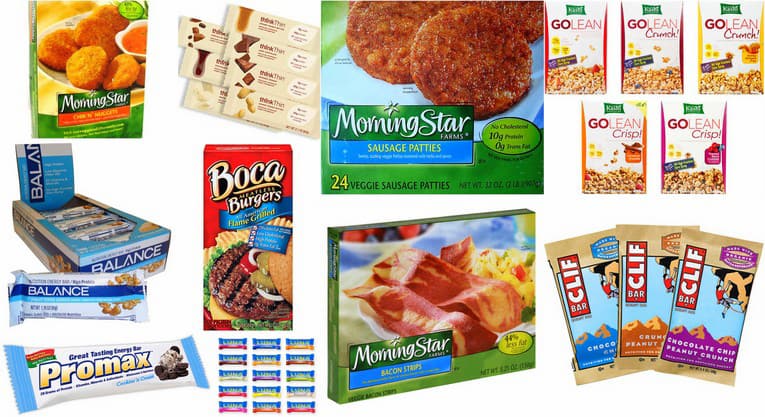
So what is soy protein isolate?
Soy protein isolate (SPI) is basically the isolated protein component from the soy bean. Creating SPI requires a heavily chemically engineered process to “isolate” that protein: the end result of which is a denatured protein that is stripped of all the nutrients (fiber, minerals, complex carbs) that the original bean contained.
Additionally, to isolate the soy protein, the soy beans are soaked and sprayed with chemicals like aluminum and hexane – which often leaves behind residue that you don’t want to be eating. Hexane is a neurotoxic petrochemical solvent that is listed as a hazardous air pollutant with the Environmental Protection Agency (EPA). The spray-drying method used for soy can also form nitrites – compounds that can form carcinogens in the body.
And if that’s not enough, SPI is always GMO and filled with pesticides.
Lastly, SPI has a higher concentration of trypsin inhibitors – which are chemicals that reduce trypsin (an enzyme that helps digest protein) in the body.
So SPI may have started out as a plant, but once it gets to you, it’s far from it. The products that use SPI also have the craziest list of ingredients and are super processed themselves (methylcellulose or disodium inosinate anyone?) – which is another reason to stay away from those products altogether. Remember if you can’t pronounce it, you probably don’t want to be eating it.
Some tips about SPI – it can be “hidden” under other names like:
- textured vegetable protein (TVP)
- soy protein concentrate
- Soya, Soja or Yuba,
- textured soy flour (TSF)
- textured soy protein (TSP)
The Bottom Line: NEVER eat products containing soy protein isolate or any “terms” related to soy protein isolate in the list above. Read your ingredient lists carefully and stay away from products with long ingredient lists you can’t pronounce!
This can be hard because lots of popular brands: Clif Bars, LUNA Bars, MorningStar, etc. have SPI on their ingredients list. But there are many other products out there that don’t! You just have to be a little more diligent and read the labels (health food stores and Whole Foods definitely have other options).
***
The Bottom Bottom Line: What to do if you’re vegetarian or want non-meat-protein sources?
#1 | Stick to natural, whole protein sources like beans, eggs, cottage cheese, Greek Yogurt, lentils, nuts, seeds and organic, non-GMO natural sources of soy like edamame, tempeh and tofu (free of sugar, artificial sweeteners, or other additives)
#2 | Try making veggie burgers at home or buy frozen veggie burgers that don’t have SPI like this kind from Amy’s
#3 | Stick to protein-bar brands that don’t use Soy Protein Isolate like Zing , LaraBar UBER, and CORE Foods. KIND is a good option as well, but read the labels carefully – some of their bars do have soy protein isolate in them! The KIND bars that don’t are a tasty and healthy snack.
#4 | If you like protein powder – try Amazing Meal or SunWarrior
That’s basically it!
In general shopping for healthy packaged food can be a challenge, but remember it’s all about reading the ingredients and knowing which ones to avoid. I hope this post helps you navigate the world of soy!
Check out these other helpful healthy eating guides!
- The 15 Healthiest Cereals for breakfast
- Healthiest Bread Brands
- 15 Pantry Meals You Can Make in 30 Minutes









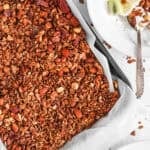

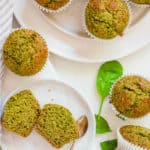
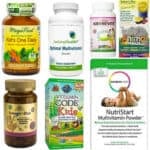
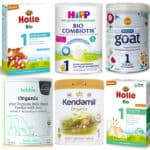















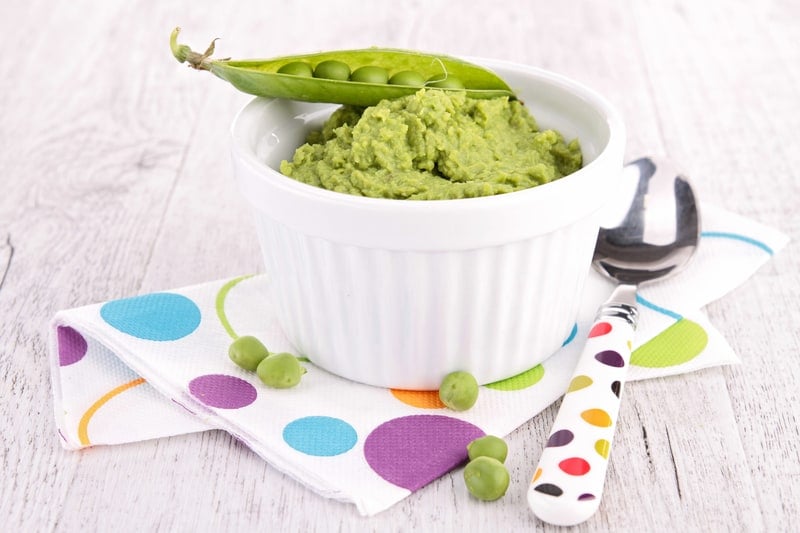



Hi Anjali,
Thank you for the detailed post! It cleared a lot of questions about protein choices for vegetarians. However I would like to know we if you have any authoritative articles to support the link between eating soy affecting people with hypothyroidism.
Best
Jaya
Hi Jaya! Thanks for reaching out! I’m glad you found this post helpful. To your question – it’s not necessarily that people with hypothyroidism have to avoid soy completely, but soy can have an effect the absorption of hypothyroid medication (indicated here), and I think this article describes how soy can affect the thyroid at a more general level. Hope that helps, let me know if you have any other questions!
Thank you for the clarification about Soy protein isolate but I do have one question. If a product says that the soy protein isolate is non-genetically engineered soybeans is that an exception or does it make any difference? thank you!
Hi Carolyn! No problem! To your question – even if the soy protein isolate is non GMO, it’s still too much soy and too concentrated/processed. The problem with soy protein isolate is that it’s not the whole organic soy bean, it’s a broken down/processed version that just removes the soy protein – which makes the soy a lot more concentrated in terms of its “dose” in the food. So I’d recommend avoiding all soy protein isolate – even non GMO or organic versions of it!
Hi Anjali, what is your opinion about soya chunks i.e. mock meat eaten by indians. I am almost 80% vegetarian now however, I would like to taste some meat in my food every other month or so. Hence, I am exploring mock meat as a substitute to make Indian curries & stuff. The problem is, most indian brands of soya meat do not state if they are made from GMO soy. And, is soya chuck a SPI ?
Thanks to reply 🙂
Hi Pope! Thanks so much for reaching out! In general, I don’t recommend soya chunks. They are often made with GMO, non-organic ingredients, and are usually filled with a lot of preservatives and artificial flavoring to make them seem more like meat. Instead I’d recommend using whole organic tofu, tempeh or seitan. I’m not sure what SPI stands for – so if you can clarify that I can let you know! Hope that helps, thanks!
Hi .I wana know soya chunks which is available in market with a nutrella packet name .Are healthy or not ??
Hi Aashii! Thanks for asking! I think these specific soy chunks are only sold in India, and I haven’t been able to find any nutritional information for them. So it’s hard for me to know what they are made of. My guess is, they are not organic, and are probably made with soy protein isolate like pretty much all “soy chunks” types of products are. So I would avoid them if possible! Hope that helps!
What abouy soy chunks
Soy Chunks are usually made with soy protein isolate — so I wouldn’t recommend those. Instead, I’d just use organic tofu or organic tempeh. Hope that helps!
What if the a bar with Soy Protein Isolate is labeled as NON-GMO soy? Is it okay then? I’m low carb and AIP Paleo and trying to find a bar that I can eat is next to impossible and I am too tired to fix anything.
Thanks!
Hi Amy! So non-GMO or organic soy protein isolate is definitely better than the non-organic/GMO version, but the issue is also with the isolated soy protein — in that, it’s such a heavy concentration of soy protein and I’m not sure what the organic extraction methods are for it, so I would still avoid it if you can. That being said, there are bars out there that are paleo specific and low carb (made with egg white protein), and there are bars that are made with whey or casein protein which I think are also paleo-friendly. So I’d keep an eye out for those bars instead! If you can’t find them at your grocery store, you can definitely find them online. Hope that helps!
Hey what about soya chunks?
It depends on the brand, but in general as far as I know, soya chunks are made with soy protein isolate, so I’d avoid those if possible. Hope that helps!
The pack says made of 100% defatted soya. Which when i searched shows that it is simply soya out of which oil has been removed.
(The nutrela brand)
Hi! If “soya” is the same as whole, organic soybeans, then I’d say that it is ok to eat. I’m not familiar with the Nutrela brand so I can’t be sure – but you can call them and ask them what “soya” is!
Also i wanted to know how much quantity of soya should i consume on a daily basis and why or why not?
I’d recommend organic whole soy beans in moderation — no more than a few times a week. This is mainly because I haven’t seen any good/definitive research on the (positive or negative) effects of consuming a lot of soy – so it’s unclear whether it’s harmful to eat too much soy. Hope that helps!
Thank you so much Anjali! Really helps!
No problem, glad to hear it!
Hey i found this article as well quite in line with your’s, thank you so much
https://articles.mercola.com/sites/articles/archive/2010/09/18/soy-can-damage-your-health.aspx
Sure no problem!
Hi Anjali! Glad i ran accross this article, and a very good one at that! I’ve been eating the Kashi Go Lean cereal every morning for several years for the amount of souable fiber in it. Souable fiber is suppose to be great for lowering colesterol, but now I am concerened about the amount of soy protein in this cereal. What are your thoughts? Thanks!
Hi James! Thanks so much for your question! It’s true: soluble fiber is great for you and does help lower cholesterol. But the Kashi Go Lean cereal does have soy protein isolate in it (that’s how they achieve the high amount of protein in the cereal) – and because of that I’d avoid it. If you’re looking for a healthy breakfast with a lot of soluble fiber – just eat plain oatmeal! Steel cut or rolled oats – either is great. Hope that helps!
Hi,
I am referring back to this post from a while back because I have a question on textured soy protein. What if it is organic? Is it okay to eat? I’m actually asking about this product here: https://elburrito.com/products/organic-soyrizo/
Can you let me know what you think?
Thanks,
Komal
Hi Komal! In general, I would stay away from isolated soy protein or textured soy protein – because it’s unclear whether the process for extracting the soy protein (even in organic products) is toxic or not. Also – the product you linked likely has a bunch of other preservatives and additives in it that are probably also best avoided. Hope that helps!